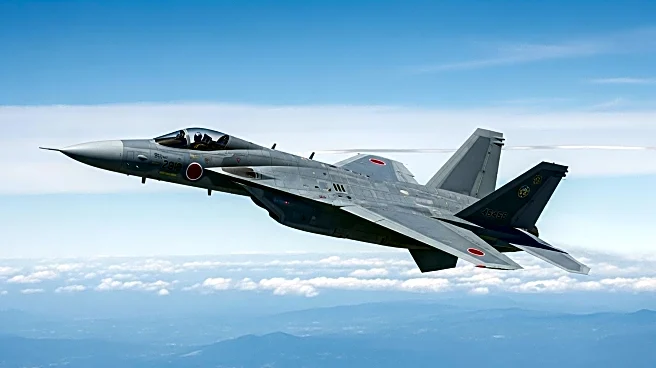What is the story about?
What's Happening?
The Japanese Ministry of Defense has submitted a record defense budget request of $60.2 billion for fiscal year 2026, marking the largest in the nation's history. This budget aims to bolster Japan's defense capabilities in response to increasing military threats from China, North Korea, and Russia. Key initiatives include the establishment of a national multi-layered coastal defense system, known as 'SHIELD,' and the construction of a new multirole frigate, the New FFM. The budget also allocates funds for the acquisition of unmanned aerial vehicles (UAVs) and unmanned surface vehicles (USVs) to enhance the Japan Maritime Self-Defense Force's (JMSDF) capabilities. Additionally, the budget includes plans for the modification of Izumo-class helicopter carriers to support F-35B fighter operations and the co-development of the Glide Phase Interceptor with the United States.
Why It's Important?
This unprecedented budget request underscores Japan's strategic shift towards strengthening its defense posture amid escalating regional tensions. The focus on advanced technologies, such as UAVs and missile defense systems, reflects Japan's commitment to enhancing its military capabilities. The collaboration with the United States on the Glide Phase Interceptor highlights the importance of international partnerships in addressing shared security challenges. The budget's approval could significantly impact the defense industry, both domestically and internationally, as Japan seeks to procure advanced military equipment and technology. This move may also influence regional security dynamics, prompting neighboring countries to reassess their own defense strategies.
What's Next?
The Japanese Ministry of Defense's budget request will be reviewed by the finance ministry, with a decision expected by late December. If approved, the implementation of these defense initiatives will proceed, potentially leading to increased procurement activities and further collaborations with international defense contractors. The development and deployment of new defense systems, such as the SHIELD coastal defense system and the Glide Phase Interceptor, will be closely monitored by regional and global stakeholders. Additionally, Japan's defense posture and its implications for regional security will likely be a topic of discussion among political leaders and defense analysts.
Beyond the Headlines
The proposed budget reflects a broader trend of militarization in the Asia-Pacific region, driven by geopolitical tensions and territorial disputes. Japan's emphasis on unmanned systems and missile defense capabilities highlights the evolving nature of modern warfare, where technology plays a crucial role. The ethical and legal implications of deploying advanced military technologies, such as UAVs and missile interceptors, may also come under scrutiny. Furthermore, Japan's defense strategy could influence its diplomatic relations with neighboring countries, as well as its role in international security alliances.

















